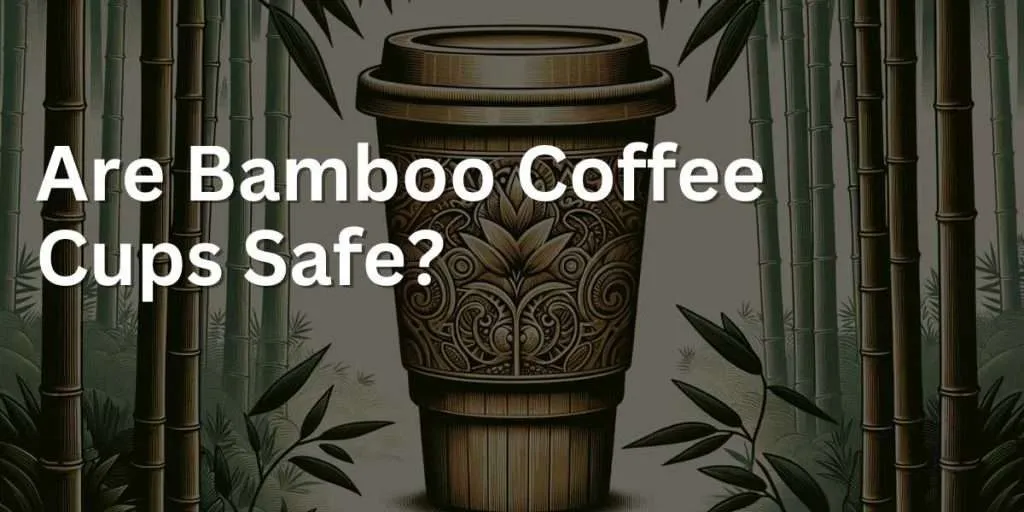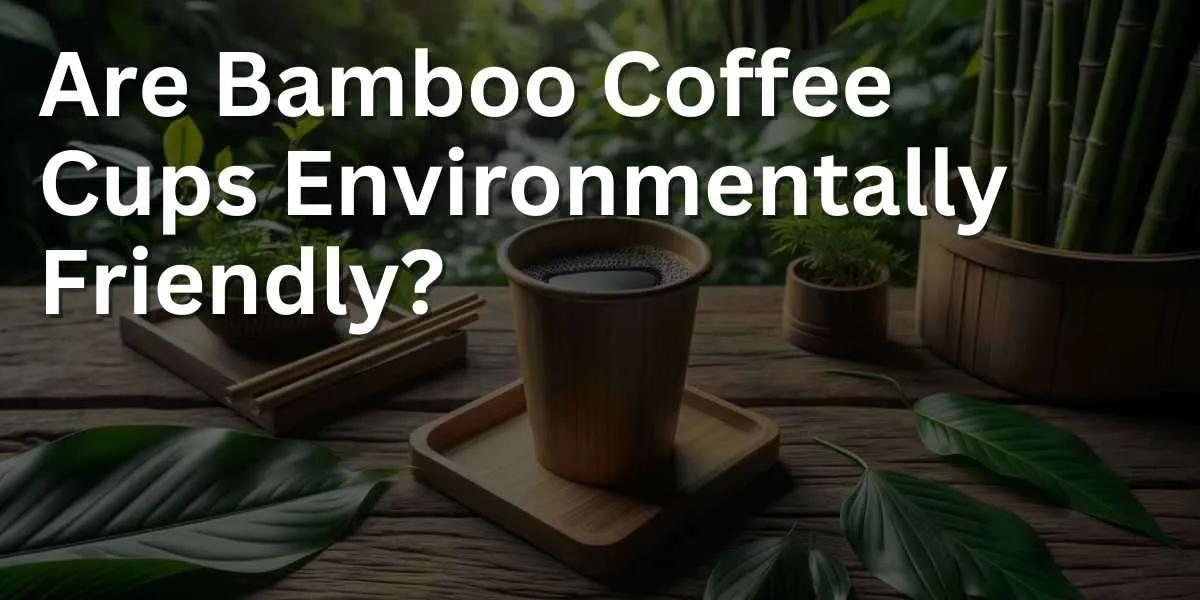Are bamboo coffee cups environmentally friendly? Navigate the eco-facts behind this trendy beverage holder. As single-use cups continue to contribute to environmental waste, many eco-conscious consumers are turning to reusable options such as bamboo coffee cups.
These cups are marketed as natural, biodegradable, and sustainable. Bamboo reusable cups are inexpensive and widely available. And they are made from bamboo right? Making them natural, environmentally friendly, biodegradable and sustainable.
Or are they? Unfortunately, the marketing doesn’t always give the whole picture.
However, there are concerns about the safety of the glue used in their production and the overall eco-friendliness of their materials. In this article, we’ll take a closer look at the pros and cons of bamboo coffee cups to determine whether they are truly environmentally friendly.
Bamboo coffee cups are marketed as eco-friendly and sustainable, but they are often made with formaldehyde and melamine glue, which may have health issues and may not be safe above 70 degrees Celsius. While bamboo has great eco-credentials as a plant, the process of breaking down its fibers to make products like coffee cups requires chemicals and high amounts of energy, reducing its overall eco-friendliness.
Key Takeaways
- Renewable Resource: Bamboo is one of the fastest-growing plants on earth, making it a renewable resource. Harvesting bamboo does not result in the plant’s death, so it can regrow without needing replanting.
- Biodegradability: Pure bamboo is biodegradable. When a bamboo product is no longer usable, it can decompose naturally without leaving harmful residues, given that it doesn’t have non-biodegradable binders or additives.
- Reduction of Single-Use Plastics: Using bamboo coffee cups can reduce the demand for single-use plastics, which are a significant source of environmental pollution.
- Lower Carbon Footprint: Bamboo absorbs more carbon dioxide during its growth and releases more oxygen than equivalent stands of trees, making it a tool against climate change.
- Binders and Additives: Not all bamboo coffee cups are made of 100% bamboo. Some may contain melamine, a type of plastic, as a binder. Melamine can release toxins when exposed to high temperatures, and it’s not biodegradable.
- Production and Transportation: The energy and resources used in the production, processing, and transportation of bamboo coffee cups can impact their overall environmental footprint.
- Durability: While bamboo cups are more durable than paper ones, they may not last as long as stainless steel or glass cups. Their environmental benefit is maximized if they’re used many times to replace single-use cups.
- Land Use: Large-scale bamboo cultivation can lead to land-use changes, potentially impacting local ecosystems.
Understanding Bamboo Coffee Cups
Bamboo coffee cups are made from bamboo fibers that are glued together using formaldehyde and melamine glue. While bamboo is a sustainable and renewable resource, the glue used in its production may contain potentially harmful chemicals.
Formaldehyde has been linked to cancer, while melamine can cause health issues if exposed to high temperatures. Therefore, it is important to consider the safety of the materials used in bamboo cups.
Bamboo coffee cups are made with bamboo fibres that are then glued together. The glue used is made from formaldehyde and melamine both of which have suspected health issues. And while melamine is not considered a dangerous substance this only applies so long as certain conditions are met.
One of those conditions is that it is kept under 70 degrees celsius.
Manufacturing Process and Environmental Impact
In addition to safety concerns, there are environmental impacts associated with the manufacturing process of bamboo cups. While bamboo is a natural and renewable resource, the process of breaking down its fibers to make products like coffee cups requires chemicals and high amounts of energy.
This reduces the overall eco-friendliness of bamboo cups. Additionally, bamboo cups cannot be recycled, further contributing to environmental waste.

Are bamboo cups safe?
Bamboo cups are often promoted as a safe and eco-friendly alternative to plastic or disposable cups. However, the safety of bamboo cups depends on several factors:
- Binders and Resins: While bamboo itself is a natural material and safe for use, some bamboo cups are made by compressing bamboo fiber with binders or resins. Some of these binders, especially melamine, can pose health risks. Melamine can release formaldehyde and other toxins, especially when exposed to high temperatures, such as hot liquids.
- Heat Resistance: If a bamboo cup contains melamine, it’s crucial to check its heat resistance. Some bamboo cups may not be suitable for very hot liquids due to the risk of toxins leaching from the melamine.
- Food-Grade Certification: It’s essential to ensure that the bamboo cup has a food-grade certification, indicating it meets safety standards for food and beverage consumption.
- Cleaning and Maintenance: Bamboo cups can develop cracks or scratches over time, which can harbor bacteria. Regular and thorough cleaning is crucial. However, bamboo cups should not be placed in the dishwasher unless specified by the manufacturer, as the intense heat and water can degrade them faster.
- BPA and Phthalates: One advantage of bamboo cups is that they typically do not contain BPA (bisphenol A) or phthalates, which are chemicals found in some plastics that can leach into food and drinks and may have health concerns.
- Allergies: While rare, some individuals might be allergic to bamboo or the resins used in the cup. It’s essential to be aware of any personal allergies.
Full disclosure, we are not health experts. However, the available research is enough for us to have chosen not to stock bamboo coffee cups.
While melamine may be perfectly safe at low temperatures, and while the ideal temperature for a cup of coffee may not exceed those temperatures we have decided that for us this is a risk we are not willing to take when there are so many other sustainable options available.
Instead we have chosen the Gosip rice husk cups which look very similar, perform in a very similar way and are more environmentally-friendly (rice husk is a waste product). Rice husk is naturally high in silica and has short fibres that are naturally water-resistant meaning there is no need for melamine.
It’s important to understand the potential risks associated with formaldehyde and melamine in bamboo cups. Formaldehyde is a known carcinogen that can cause respiratory issues and allergic reactions. Melamine, when exposed to high temperatures, can release toxic fumes that are harmful to human health and the environment. Therefore, it is important to consider the potential risks associated with using bamboo cups.
Are cups made from sustainable bamboo environmentally friendly?
This is a tough question as it’s actually quite subjective as it depends on how you are looking at it.
Bamboo has great eco-credentials as it grows incredibly quickly without the need for chemicals and can be harvested without damaging the plant or the soil.
Bamboo can also be used in seemingly endless ways. It’s super strong so makes a great building material and scaffolding. It is naturally antibacterial so makes a great material for kitchen countertops and chopping boards. And the fibres can be turned into everything from socks to reusable bamboo coffee cups.
However once you get to breaking down the fibres and turning them into fabrics or cups etc you start to need chemicals (like melamine resin) and high amounts of energy which reduces the eco-credentials. What was once a naturally eco-friendly and biodegradable material becomes a completely different material that behaves in a completely different way.
By the time bamboo has been turned into a reusable bamboo coffee cup it is no longer biodegradable in any real sense and it cannot be recycled. Now that doesn’t mean that it’s not better for the environment to use a reusable bamboo cup than a 100 or a 1000 single-use cups. It is. It just means that they might not be as eco-friendly as we are initially led to believe.
Sustainable Alternatives
Instead of using bamboo cups, there are other sustainable options available, such as rice husk cups. Rice husk cups are made from a waste product that is naturally water-resistant and does not require melamine to be turned into a reusable cup. Additionally, other sustainable alternatives include reusable glass or metal cups. By choosing sustainable alternatives, we can reduce our environmental footprint and make a positive impact.
There are also economic benefits to using sustainable alternatives to single-use cups. Reusable cups can lead to cost savings over time, as well as benefit local economies by supporting small businesses that produce sustainable alternatives.
To ensure that we are making the most sustainable choices, it’s important to properly dispose of or repurpose bamboo coffee mugs, as well as properly care for and maintain sustainable alternatives such as rice husk cups. By doing so, we can reduce waste and maximize the eco-friendliness of our choices.
FAQs on How Safe Are Bamboo Cups
Are bamboo coffee cups safe to use?
While there are potential health risks associated with the glue used in reusable bamboo cups, the risks may be small and depend on individual use and exposure. Some health experts advise against using bamboo cups, while others consider them safe for use at low temperatures.
Are bamboo coffee cups biodegradable?
While bamboo is a natural and renewable resource, the process of breaking down its fibers to make products like coffee cups requires chemicals and high amounts of energy. This reduces the overall biodegradability of bamboo cups. Bamboo cups cannot be recycled, further contributing to environmental waste so it might be best to opt for other reusable coffee cups which are more sustainable.
What are some sustainable alternatives to bamboo coffee cups?
Sustainable alternatives include reusable glass or metal cups and rice husk cups. Rice husk cups are made from a waste product that is naturally water-resistant and does not require melamine.
How can I properly dispose of or repurpose bamboo cups?
Bamboo cups cannot be recycled, so it’s important to dispose of them properly. Repurposing options include using them as planters, pencil holders, or even bird feeders. If the cups are no longer usable, they should be disposed of in a landfill bin.
How can I properly care for and maintain sustainable alternatives such as rice husk cups?
Rice husk cups can be washed in the dishwasher or by hand with soap and water. To prolong their lifespan, it’s important to avoid exposing them to high temperatures or harsh chemicals.





